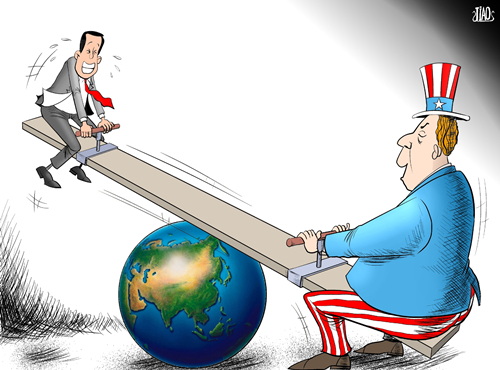Free Asia-Pacific from Western hold
- By Thorsten Pattberg
 0 Comment(s)
0 Comment(s) Print
Print E-mail China Daily, November 13, 2014
E-mail China Daily, November 13, 2014
Asia-Pacific Economic Cooperation is meant to liberalize many profitable fields: free trade, innovative growth, and land and sea connectivity. This is fine. But it should also usher in a new Asia-Pacific culture, and here is why:
|
|
|
Setting the balance [By Jiao Haiyang/China.org.cn] |
APEC has 21 economically, geographically and culturally diverse members, which account for about 40 percent of the world's population, 44 percent of global trade and 55 percent of world GDP. Yet its cultural baggage is 100 percent Anglo-European. This needs to change.
When Mark Zuckerberg, one of the co-founders of Facebook, spoke in Chinese to a group of students at Tsinghua University on Oct 22, he was cheered by China's media. For more than 300 years, the Europe-centric (or West-centric) world has categorically omitted, suppressed and excluded Chinese words, ideas and names from world history, and here was a Western celebrity who broke the spell.
True, Zuckerberg's Facebook is not available in China for the time being for reasons of national security. Beijing simply cannot trust Washington not to use US companies for geopolitical ends, as seen in Germany and Japan which have turned into US satellite states, literally. But China has its own world-class services such as Tencent's QQ and Sina's Weibo, a popular microblogging service in China.
If US President Barack Obama really meant what he said on Nov 6, that Sino-US relations will determine the future (of the world), the West-centric way of thinking has to be abandoned.
First, US publishers, editors and journalists will have to learn and adapt Chinese key terminologies like zhongguomeng (Chinese Dream) and tianxia (under heaven), just like Asians before adopted Western terms such as "philosophers", "the arts" and "pizza". It's simple reciprocity. Translation, an archaic way of silencing, marginalizing or disowning other people's originality, must come to an end.
This is especially true for Western pseudo-global publications, such as The New York Times, The Wall Street Journal, The Economist, Bloomberg and Science magazine, which are constantly censoring China (and all other non-Western countries), guided by outdated Orwellian rules of writing and the racist notion that their papers must be clean of foreign pollution.






